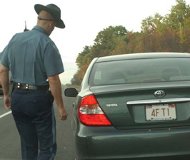Article from: www.thenewspaper.com/news/34/3461.asp
4/22/2011
Massachusetts Court: Marijuana Smell Not Enough for Traffic Stop
Massachusetts Supreme Judicial Court rules a police officer may no longer search a motorist merely on the basis of smelling pot.
 The highest court in Massachusetts ruled Tuesday that a police officer is not justified in stopping and searching an automobile merely because he smells the presence of marijuana. The Supreme Judicial Court took up the case of Benjamin Cruz to clarify the legal impact of a 2008 voter referendum that had decriminalized possession of less than one ounce of pot in the Bay State.
The highest court in Massachusetts ruled Tuesday that a police officer is not justified in stopping and searching an automobile merely because he smells the presence of marijuana. The Supreme Judicial Court took up the case of Benjamin Cruz to clarify the legal impact of a 2008 voter referendum that had decriminalized possession of less than one ounce of pot in the Bay State.
On June 24, 2009, Boston Police Officers Christopher Morgan and Richard Diaz were cruising the Hyde Square neighborhood in an unmarked Ford Crown Victoria in plain clothes. At around 5pm, the officers spotted Cruz in the passenger seat of a car parked on the side of the road in front of a fire hydrant. Cruz was smoking a small cigar with the windows rolled down. The officers got out of their car, approached Cruz and asked what he was doing. Officer Morgan claimed he smelled a "faint odor" of marijuana and Officer Diaz noted that Cruz appeared to be nervous. Cruz was ordered out of the car and searched. Police found 4 grams of crack cocaine and arrested Cruz.
A lower court judge ruled that the officers had no reasonable basis to order Cruz out of the car because there was no evidence that any crime had been committed. The supreme court majority agreed.
"Although we have held in the past that the odor of marijuana alone provides probable cause to believe criminal activity is underway, we now reconsider our jurisprudence in light of the change to our laws," Chief Justice Roderick L. Ireland wrote. "Our analysis must give effect to the clear intent of the people of the Commonwealth in accord with article 14 of the Massachusetts Declaration of Rights and the Fourth Amendment to the United States Constitution."
The high court argued that the officers could have ticketed the vehicle's driver for parking by a hydrant, but no more. The court cited arguments made in the official voter guide to explain that voters intended to have police focus on more serious crimes than marijuana possession.
"By mandating that possession of such a small quantity of marijuana become a civil violation, not a crime, the voters intended to treat offenders who possess one ounce or less of marijuana differently from perpetrators of drug crimes," Ireland wrote. "Here, no facts were articulated to support probable cause to believe that a criminal amount of contraband was present in the car. We conclude, therefore, that in this set of circumstances a magistrate would not, and could not, issue a search warrant. Because the standard for obtaining a search warrant to search the car could not be met, we conclude that it was unreasonable for the police to order the defendant out of the car in order to facilitate a warrantless search of the car for criminal contraband under the automobile exception."
Source: Massachusetts v. Cruz (Massachusetts Supreme Judicial Court, 4/19/2011)
Permanent Link for this item
Return to Front Page
 The highest court in Massachusetts ruled Tuesday that a police officer is not justified in stopping and searching an automobile merely because he smells the presence of marijuana. The Supreme Judicial Court took up the case of Benjamin Cruz to clarify the legal impact of a 2008 voter referendum that had decriminalized possession of less than one ounce of pot in the Bay State.
The highest court in Massachusetts ruled Tuesday that a police officer is not justified in stopping and searching an automobile merely because he smells the presence of marijuana. The Supreme Judicial Court took up the case of Benjamin Cruz to clarify the legal impact of a 2008 voter referendum that had decriminalized possession of less than one ounce of pot in the Bay State.